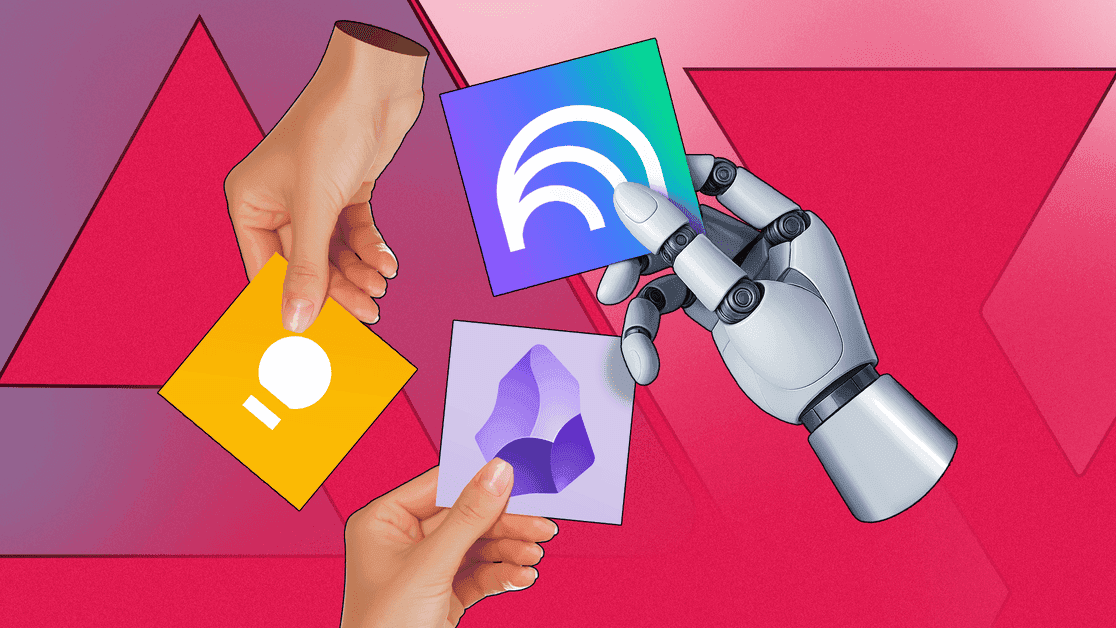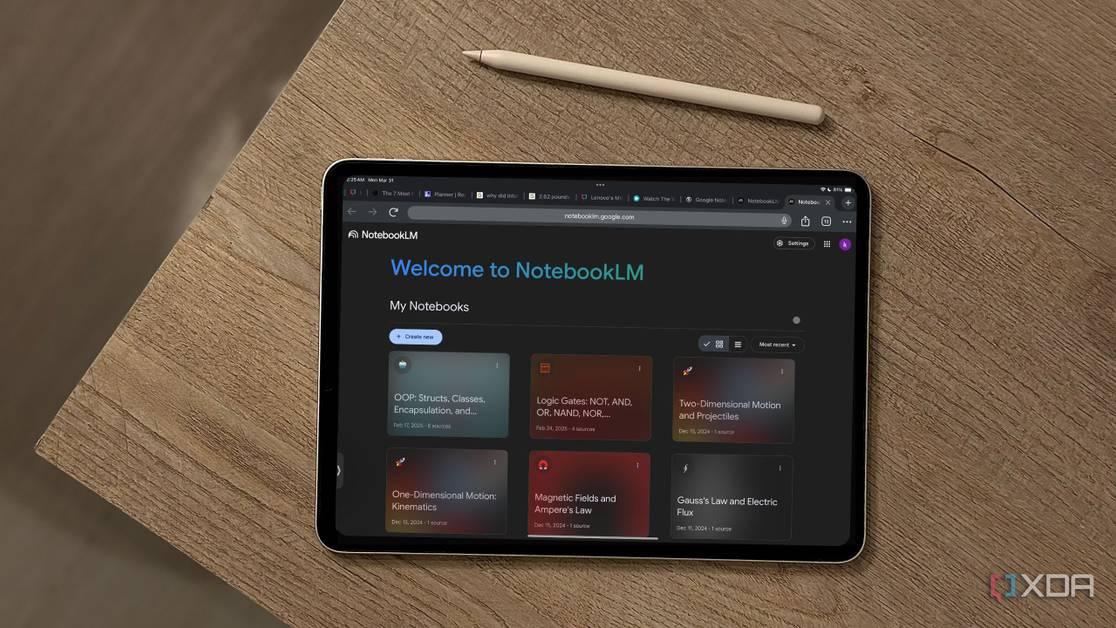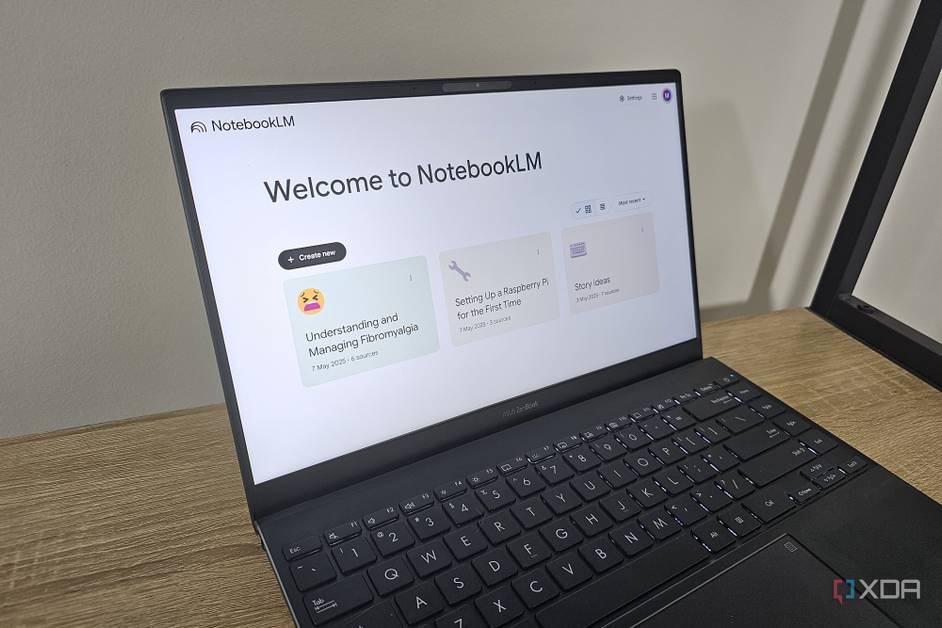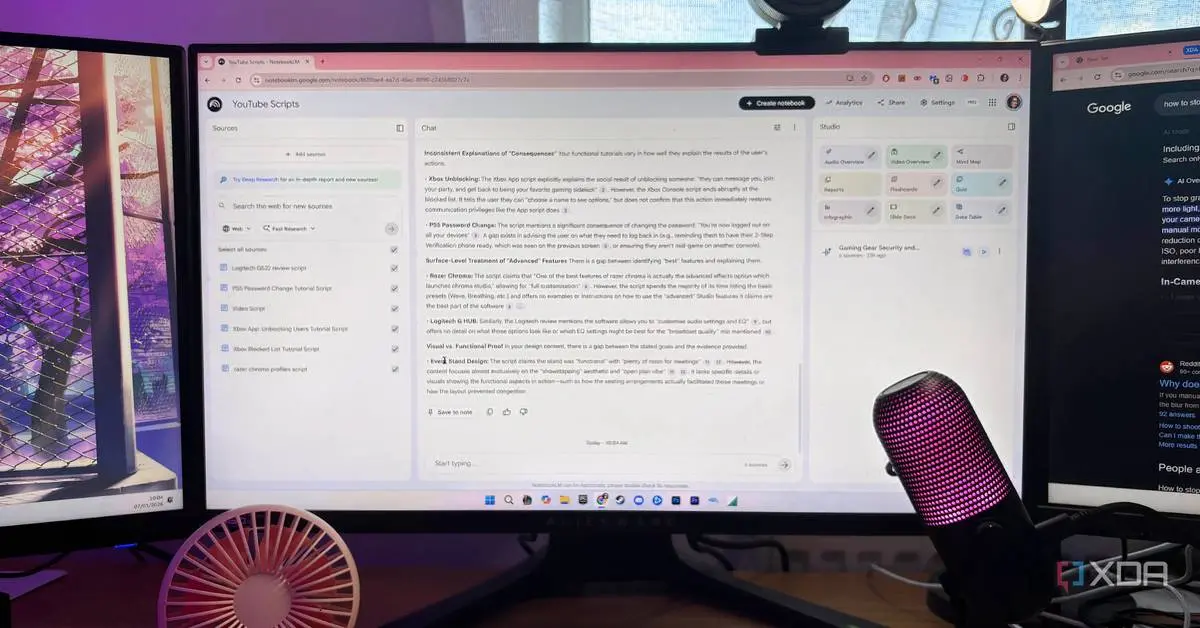NotebookLM: Google's AI-Powered Note-Taking Tool Revolutionizes Personal Knowledge Management
2 Sources
2 Sources
[1]
3 unexpected ways I'm using NotebookLM to keep my brain uncluttered
I only started taking NotebookLM seriously a while ago. I treated it more like a notetaking app that has an AI layer. But the more I used it and started feeding it my thoughts, it clicked. It's not that NotebookLM makes me more productive now, it just helps me free up mental bandwidth. I don't have to hold everything in my head or keep circling back to half-baked thoughts over and over. I've ended up using NotebookLM in ways that are sideways from how it was designed and what Google had intended. Not the study buddy cases you see in promo and tutorial videos, but little hacks that make my mind feel clearer and less crammed. Here's what's been working for me so far... Turning bookmark clutter into playlists I don't mindlessly hoard bookmarks anymore At any given point, I have about five bookmark folders in my browser with 50+ pages saved in each. When I come across an interesting read or something that could be useful later, I have to safe keep it. These bookmark folders were somewhat structured before -- one for design courses and learning materials, another for mental health resources, and one for IMDb lists, you get the idea. The problem is, I seldom circled back to all of these pages, and when I did, it was by randomly clicking on things and being surprised at what popped up. So, I started pulling these links into NotebookLM instead. Firstly, it helped me find a better organizational structure than I had with the folders, sorting them into categories that made more sense (after I prompted it to). It also created a summary of each page for me, highlighting the key ideas so I can get a quick overview of what's inside. This made it much easier to decipher whether a bookmark was worth keeping or discarding -- a lot of pages didn't end up making the cut. Now I have a better bookmark system that I can actually act on without getting overwhelmed and avoiding it. I also have another bookmark folder, "NotebookLM", which serves as the first dump ground for anything I bookmark. Every so often, I put all those pages through NotebookLM to see what's worth keeping and shift it to a relevant folder, or get rid of it. This system is kind of like music playlists with defined genres consisting only of songs I actually like and can easily shuffle through. Notes junk drawer, sorted Finally, a way to sort through every piece of text My notes apps are all junk drawers -- seriously, it's a mess. Copied text from articles, meeting notes, fragments of ideas, things I note down, or paste "just in case". This concoction of notes piles up fast. I've tried using other AI tools like ChatGPT to help me organize and make sense of it, but with little success, as those chats also just end up in cluttered chaos. Enter NotebookLM. It turned out to be the easiest way to clean this up. I drop all my messy text into a notebook and ask it to organize it into categories first and foremost. The Mind Map feature also comes in very handy because it gives me a visual overview so I can easily make connections between my notes. More than that, I also use NotebookLM as a sort of "second opinion." If I'm staring at 20 half-baked notes, I'll ask which ones are worth keeping and elaborating on, and which I can ignore. This doesn't mean I'll always follow the AI's judgment, but it lets me offload a lot of decision fatigue by helping me stop treating every line of text like it's sacred. As explained in this NotebookLM-as-a-second-brain feature, I can also resurface my ideas more easily. For example, if I want to reflect on a specific part of my design learning of the week, perhaps colors, I ask NotebookLM to bring forth everything related to that topic from my notes. My "anti-overwhelm" handbook A quick way to get to the sources I need This method applies to any topic, but I've found it to be most helpful for my mental health arsenal. I've collected more mental health resources than I care to admit -- PDFs from practitioners, articles, and social media threads. The problem is, once overwhelm hits, the last thing I want to do is scour through these sources to find what I need in the moment. NotebookLM has become a shortcut for this... By consistently dropping my mental health resources and learning into the notebook, I can describe the situation I'm dealing with in a prompt, and NotebookLM will surface the most relevant material for that scenario. Not only that, but it will also give me a more digestible summary of the information, so I don't have to read all the sources or my own notes again. It's like outsourcing some of the executive function work of remembering and choosing, so I can focus on my coping strategies right away. For example, if the issue relates to sleep, I don't want to dig through a list of panic or identity resources -- I can quickly be reminded of the strategies I've created to deal with said sleep issue, along with the sources I based the strategy on. Less clutter, more headspace NotebookLM wasn't a tool I expected to integrate to this degree, but it ended up carving out a little space in my head. And I'm not even using it to become a productivity machine or help me with every decision, I'm just using it to help clear out a bit of mental clutter so I can actually think. It's always these sideways use cases of a tool that end up sticking - so instead of a study buddy, NotebookLM is more like my mental sieve. NotebookLM See at NotebookLM Expand Collapse
[2]
Can AI organize your notes better than you? I tested NotebookLM against Obsidian and Keep
I've been chasing the perfect note-taking system for years. At one point, my phone had a dozen apps dedicated to filing away every stray thought. I used Google Keep for quick checklists, Obsidian for long-term knowledge storage, Docs for drafts, and numerous screenshots and PDFs in Drive. On paper, it appeared like a well-structured setup. But in reality, I'd waste more time hunting for a half-remembered note than actually using it. That's when I decided to try something new: letting AI handle the organizing for me. I compared NotebookLM with my current workflow using Obsidian and Google Keep, two of my most frequently used note-taking apps. The question I wanted to answer was simple: Can AI make sense of your notes better than you can? How I tested the organization setup Creating a fair playing field I set up three note workspaces, each containing the same mix of material: Research PDFs I've been meaning to read Random clipped quotes from articles A few voice-transcribed thoughts (in text format) Task lists and ideas for upcoming projects In Google Keep, these looked like sticky notes, tags, and color-coded boxes. In Obsidian, it became a network of markdown files linked together with backlinks. And in NotebookLM, I uploaded the exact files and snippets into one project that the AI could summarize, query, and cross-reference. Then I used each setup for a week to plan, research, and draft ideas. NotebookLM: The AI-powered hub AI does the heavy lifting The most notable change with NotebookLM was the minimal amount of manual work. Instead of building my folder system or links, I dumped everything in: PDFs, copied text, notes, and bits from Docs. Within seconds, the app treated it as a connected knowledge base. The summaries were the killer feature. I could upload a dense 40-page paper and ask NotebookLM to extract the key arguments or recurring themes. Instead of manually skimming, I got bullet points in under a minute. It also added citations pointing back to my uploaded files. That way, I could verify the results myself. Even better, I could ask questions in plain English. When I tested it with some research notes on motivation, I asked: "How do goal-setting strategies connect to long-term performance?" NotebookLM pointed me to the papers I'd uploaded and quoted the relevant passages. That's something I could never get from Keep, and even in Obsidian it would've required careful tagging and linking. However, the downside is that NotebookLM doesn't replace a good annotation tool. It's not great if you want deep manual control over your files. You also need to trust Google with your data, which may not be acceptable to everyone. Obsidian: The networked brain A powerful yet demanding note-taking system Obsidian is a Markdown-based note app that lets you link notes into a web of connected ideas. I've used it as my "second brain," and it's one of the best tools for long-term knowledge. Obsidian has one of the best manual linking systems. For example, I connected an audio transcript, a summary of a research article, and my notes into a cluster of related ideas. Later, when browsing my graph view, I could see those links visually. That's something NotebookLM can't replicate yet. But there's a catch. Obsidian requires maintenance. If I forget to tag something properly or neglect to link notes, they get buried. On busy weeks, it just became another cluttered vault. Google Keep: The quick capture champ But the system is messy Google Keep is the opposite of both NotebookLM and Obsidian. It's light, fast, and perfect for jotting things on the go. I've relied on it to capture fleeting ideas, whether it's a book title, a shopping list, or a design concept. Keep worked best in terms of speed and accessibility. A widget on my home screen helped me open a note in seconds, and a search usually got me what I needed. However, it fell flat when it came to organizing. Tags and colors are the only tools you get, and after you've accumulated hundreds of notes, that system buckles. For this experiment, Keep was the least effective at making sense of my scattered material. Where NotebookLM wins (and where it doesn't) The AI edge What surprised me most about NotebookLM was how it organized my notes with almost no effort. I could upload 10 articles, ask it for a comparison of viewpoints, and get something coherent in seconds. That would have taken me hours with Obsidian or Keep. I didn't have to remember where I'd filed something or what tag I used. I just asked questions in natural language. That said, NotebookLM never felt like a proper replacement for my manual systems. It's a powerful layer on top, but I wouldn't trust it as my only repository. Obsidian is still better for building a personal knowledge base that will last years, and Keep still wins for jotting down quick notes on the fly. The future of note-taking If your notes are cluttered and spread across multiple apps and devices, consider giving NotebookLM a try. Whether you're managing research, writing projects, or trying to remember what you read last week, AI can help lighten the cognitive load. It is worth noting that it won't replace the discipline of a well-maintained vault in Obsidian or the convenience of a sticky-note app. However, it can transform disorganized notes into something usable.
Share
Share
Copy Link
Google's NotebookLM emerges as a powerful AI-driven note-taking and organization tool, offering unique features that help users manage information overload and enhance productivity.
Google's AI-Powered NotebookLM Redefines Note-Taking
Google's NotebookLM, an AI-powered note-taking tool, is gaining attention for its ability to revolutionize personal knowledge management. Users are discovering unexpected ways to leverage the platform's capabilities, moving beyond traditional note-taking to create a more organized and accessible information ecosystem
1
.Transforming Bookmark Clutter into Actionable Playlists
One of the standout features of NotebookLM is its ability to transform disorganized bookmarks into structured, easily navigable playlists. Users can import their bookmarked links into the platform, where the AI organizes them into logical categories and provides concise summaries of each page's content. This process not only helps in decluttering but also aids in decision-making about which bookmarks are worth keeping
1
.Organizing the Digital Junk Drawer
NotebookLM excels at sorting through miscellaneous digital notes, a task that often overwhelms users of traditional note-taking apps. The platform's AI can categorize diverse pieces of information, create visual mind maps for easy overview, and even offer suggestions on which notes are worth keeping or elaborating upon. This feature significantly reduces decision fatigue and helps users maintain a more organized digital workspace
1
.AI-Powered Information Retrieval
A key advantage of NotebookLM is its ability to quickly surface relevant information based on user queries. This feature proves particularly useful for managing extensive collections of resources, such as mental health materials. Users can describe a situation, and the AI will present the most pertinent information along with digestible summaries, streamlining the process of accessing and applying stored knowledge
1
.Comparative Advantage Over Traditional Note-Taking Apps

Source: Android Police
When compared to popular note-taking applications like Obsidian and Google Keep, NotebookLM demonstrates unique strengths. While Obsidian excels in manual linking and long-term knowledge storage, and Google Keep shines in quick note capture, NotebookLM bridges the gap by offering AI-powered organization with minimal user effort
2
.Related Stories
AI-Driven Summarization and Cross-Referencing

Source: XDA-Developers
NotebookLM's ability to summarize lengthy documents and cross-reference information across multiple sources sets it apart from traditional note-taking tools. Users can upload various file types, including PDFs and text snippets, and the AI quickly extracts key arguments and themes. This feature significantly reduces the time spent on manual skimming and note-taking
2
.Limitations and Considerations
Despite its impressive capabilities, NotebookLM is not without limitations. It may not fully replace specialized annotation tools or satisfy users who prefer deep manual control over their files. Additionally, privacy-conscious users may have concerns about entrusting their data to Google's AI systems
2
.The Future of AI-Assisted Note-Taking
As NotebookLM continues to evolve, it represents a significant step towards AI-assisted personal knowledge management. While it may not entirely replace traditional note-taking methods, it offers a powerful complement to existing systems, particularly for users struggling with information overload and disorganized digital notes
2
.References
Summarized by
Navi
[1]
Related Stories
NotebookLM: Revolutionizing AI-Powered Productivity and Knowledge Management
28 Jul 2025•Technology

Google's NotebookLM: Revolutionizing AI-Powered Productivity and Research
27 May 2025•Technology

NotebookLM: Google's AI-Powered Research Assistant Revolutionizes Information Management
20 Jul 2025•Technology

Recent Highlights
1
ByteDance's Seedance 2.0 AI video generator triggers copyright infringement battle with Hollywood
Policy and Regulation

2
Demis Hassabis predicts AGI in 5-8 years, sees new golden era transforming medicine and science
Technology

3
Nvidia and Meta forge massive chip deal as computing power demands reshape AI infrastructure
Technology





